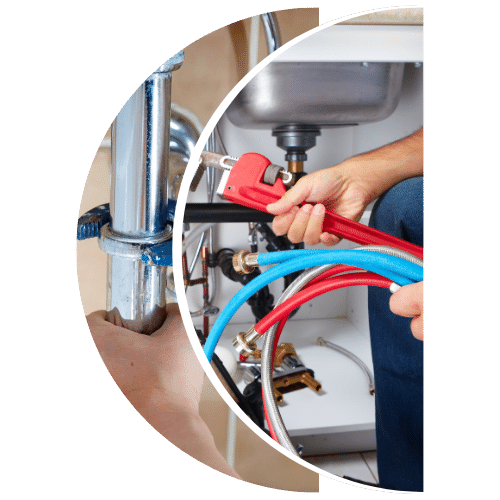New! Low rates for Pennsylvania plumbers
Get a Quote
Insure Your PA Plumbing Company Today
Save up to 20% on plumbers insurance coverage

Save up to 20% on plumbers insurance coverage

We’re available when you are – online and on your schedule. In less than 5 minutes, you could be on your way to a commercial insurance quote.
Finally, insurance shopping the way you deserve. Data and technology to streamline your experience. Real, live agents to keep things human.
As an independent agency, we can shop around our network of carriers, and deliver the best quote to you. Bundle policies to save even more.
Every policy backed by leading insurance carriers known for their financial strength and customer service. All our carriers have earned a rating of A or higher by A.M. Best.
Since 2012, we've helped thousands of small businesses get the coverage they need. It's insurance, simplified for small business.
Policies made just for you, and that you can't get anywhere else. Unlock access to bespoke insurance products from leading commercial carriers.

From burst pipes to root intrusion, you know that accidents can and do happen. Our plumbing insurance policies are tailored to meet the unique needs of small business owners like you.
Don't leave your business vulnerable to potential risks. Get the insurance you need today and have peace of mind knowing you're covered. Contact us to learn more.
If you're a plumbing contractor, you've got a lot on your plate. You have to make sure your clients are happy, and protect your business from any surprises. Having the right business insurance policies can help.
Before we dive into the types of insurance policies that are available for plumbing contractors, let's talk about why insurance is so important. Plumbing businesses face a variety of risks that could lead to financial losses, lawsuits, and even the closure of the business. Some of the top risks that plumbing contractors face include:
Plumbing businesses should carry several standard commercial insurance policies to protect against these risks.
Understanding these unique risks and addressing them through comprehensive insurance coverage is essential for plumbing business owners in Pennsylvania. By partnering with a trusted insurance provider that specializes in serving the needs of plumbing businesses, owners can ensure they have the necessary protection to mitigate risks, comply with regulations, and safeguard their financial stability.
There are several types of insurance policies that plumbing contractors need to consider. Let's take a look at some of the most important ones.
Liability insurance, also known as plumbing business liability insurance or general liability insurance, covers your business in case of accidental damage to property, personal injury claims from a customer or third party, and legal fees and settlement costs in case of lawsuits.
For example, if a customer slips and falls on a job site, this insurance policy will cover medical expenses or legal fees that may arise.
Workers' compensation insurance is essential for plumbing business owners in Pennsylvania to protect their employees in the event of on-the-job injuries or illnesses. This type of insurance provides coverage for medical expenses, lost wages, rehabilitation costs, and other related expenses.
Plumbers, as skilled tradespeople, face higher risks of work-related injuries compared to other industries. Their work involves physical labor and exposes them to specific risks such as operating large equipment, using potentially dangerous tools, working at heights, in trenches, and outdoors, as well as potential exposure to chemicals, sewage, or mold. It's important to note that subcontractors are the responsibility of the general contractor, unless they have their own workers' compensation insurance. General contractors often include subcontractors in their work comp policy or require proof of insurance before allowing them on the jobsite.
Workers' compensation insurance is a legal requirement in Pennsylvania for almost all employers. This includes small businesses with one or more employees. The state considers family members working for the business as employees as well. Failure to have this coverage can result in significant fines and legal penalties.
There are specific provisions in Pennsylvania law regarding independent contractors. The Construction Workplace Misclassification Act makes misclassification of employees as independent contractors illegal in commercial and residential construction. Employers cannot classify workers as contractors to avoid providing workers' compensation insurance. In case of a contested workers' compensation claim, the courts will determine the worker's classification as an employee.
Pennsylvania Act 72 establishes exceptions for certain workers who may be exempt from workers' compensation coverage, such as executive officers, domestic workers, federal workers, sole proprietors, and general partners. However, any workers who do not fall under these exceptions must be covered by an active workers' compensation insurance policy.
Understanding and adhering to these workers' compensation laws is crucial for plumbing business owners in Pennsylvania. By partnering with a reputable insurance provider that specializes in serving the needs of plumbing businesses, tiling company owners can ensure they have proper coverage to protect their employees and comply with state regulations.
Plumbers need specialized equipment to do their work, including power tools, hand tools, and other equipment. In addition, they may store supplies and inventory at their business location. if this equipment or property is stolen, damaged, or destroyed, it can have a significant impact on the plumbing contractor's ability to continue operating their business.
Property insurance provides coverage for your business property, like an office space, as well as some tools, inventory and equipment. For example, if your plumbing tools are stolen from your work truck, plumber's property insurance will cover the cost of replacing them. If your office is damaged by a fire, this insurance policy will cover the cost of repairs.
Tool or equipment insurance can provide additional coverage for plumbing tools and equipment. This policy covers damage or theft of expensive tools and equipment, losses due to tool breakdowns or malfunctions, and costs associated with renting or replacing lost or damaged tools.
For example, if your expensive drain cleaning machine breaks down during a job, plumbing tools insurance will cover the cost of repairs or replacement. If your tools are stolen from your job site, this insurance policy will cover the cost of replacing them
Professional liability insurance, also known as errors and omissions insurance, can help protect plumbing contractors from claims of negligence, misrepresentation or breach of contract. This type of insurance policy can help cover legal fees and settlement costs in case of lawsuits.
Coverage options for professional liability insurance for plumbers can vary depending on the specific needs of the contractor. Some policies may include coverage for defense costs, while others may only cover settlements or judgments. It is important for plumbing contractors to work with their insurance agent to find the right coverage for their business.
Examples of scenarios covered by this insurance policy:
Plumbing contractor bonds are actually a type of insurance policy that helps protect customers from financial loss due to a plumbing contractor's failure to meet their obligations. These bonds can help ensure that the contractor completes the work they have been hired to do, pays their suppliers and subcontractors, and follows building codes and regulations.
How do plumbing contractor bonds work? When a plumbing contractor purchases a bond, they are essentially purchasing a guarantee that they will fulfill their obligations. If a plumbing contractor fails to meet their contractual obligations, the customer or supplier can file a claim against the bond to recover their losses. The surety company that issued the bond will investigate the claim and, if valid, pay the claimant up to the bond's limit. The plumbing contractor will then be required to repay the surety company for the amount of the claim.
Plumbing contractor bonds can also protect against violations of building codes or regulations. If a contractor violates a building code or regulation, the bond can be used to pay any fines or penalties that may be imposed.
Examples of scenarios covered by this insurance policy:
Plumbing business interruption insurance, also known as business income insurance, can help plumbers recover lost income and pay ongoing expenses if their business is forced to shut down due to a covered loss, such as property damage from a fire or natural disaster. Business interruption insurance can cover lost income, ongoing expenses, and extra expenses incurred to minimize the interruption of business operations.
Coverage options for plumbing business interruption insurance may include:
Plumbing contractor auto insurance, also known as commercial auto insurance, can provide coverage for plumbing business vehicles, such as vans or trucks, and protect the business from financial loss due to accidents, theft, or other damage.
Coverage options for plumbing contractor auto insurance may include:
Small businesses are actually defined as having fewer than 100 employees, and micro-businesses have fewer than 10. Regardless of your business size, there are a few things to consider when buying small business insurance:
Here are some examples of scenarios that may be covered by plumber's small business insurance:
If your plumbing business has employees, it's important to have the right insurance policies in place to protect your business and your employees.
Here are some insurance policies that plumbing companies may need if they have employees:
If you are a self-employed plumbing contractor without any employees, you may be wondering if you need workers' compensation insurance. The answer is, it depends.
In most states, workers' compensation insurance is required for businesses with employees. However, if you are a self-employed contractor, you may be exempt from this requirement. It's important to check with your state's laws to see if you are required to have workers' compensation insurance.
When purchasing workers' compensation insurance as a self-employed contractor, you'll need to consider whether to include or exclude yourself in the policy. Including yourself in the policy will increase the cost of the insurance, but it will also provide coverage for injuries you may sustain while on the job.
Even if you are not required to have workers' compensation insurance, it's still a good idea to consider purchasing a policy. Accidents can happen, and if you are injured on the job, workers' compensation insurance can provide coverage for medical expenses, lost wages, and other costs associated with the injury.
It's also important to note that some job sites may require proof of workers' compensation insurance before allowing contractors to step onto the site. Without this proof, you may not be able to work on certain jobs.
If you work with subcontractors, you may also need to consider whether to cover them under your workers' compensation policy. In some cases, subcontractors may be required to carry their own workers' compensation insurance, and as the general contractor, you may be held liable if they don’t have an active policy.
It's important to discuss these issues with your business insurance agency to ensure that you have the right coverage in place for your business.
Custom Commercial Insurance Solutions is on a mission to make insurance shopping simple and convenient — for all businesses, everywhere. By bringing together data-rich embedded integrations, bespoke insurance products and world-class customer service, CCiS powers digital experiences backed by a team of licensed agents.
Finally, commercial insurance is easy for business owners, profitable for partners, and accessible wherever small businesses shop. Learn more at ccisagency.com.
We make buying insurance easy for small business.










